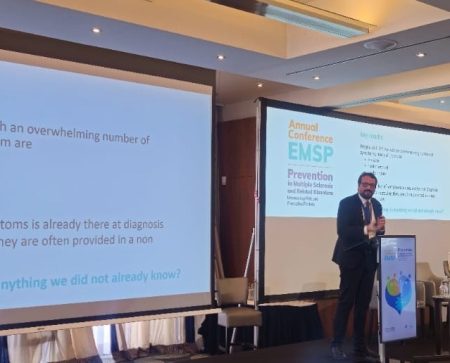
Ground-breaking research with potential for MS treatments launched
22.09.2023Targeting Epstein-Barr virus to treat and prevent MS
Researchers launch pioneering EU funded research initiative to uncover role of Epstein-Barr virus in multiple sclerosis, building on recent research breakthrough
Recent evidence strongly implicates infection by the Epstein-Barr virus (EBV) as the trigger for development of multiple sclerosis (MS). An international research team is now gathering to unveil the role of EBV in the onset and progression of the MS disease.
The team has ambitious goals:
“We aim to find out why only a few EBV infected people develop MS, and define the underlying mechanism of this process”, explains the principal investigator (PI), Professor Kjell-Morten Myhr of the University of Bergen.
“Our research will also seek to investigate if targeting the EBV infection with antiviral treatments can improve the disease course or even stop disease progression”, says Myhr.
“Development of prevention strategies like vaccination would be the next step”, says the co-principal investigator, Professor Øivind Torkildsen at Haukeland University Hospital.
From theory to action
The researchers, representing leading universities and hospitals in Europe and USA, will perform clinical trials of antiviral therapies targeting the EBV infection in MS, analyze blood and saliva samples, as well as performing registry-based research.
They will build on their extensive experience and previous research within their respective fields, and take advantage of high-quality health registries and existing research cohorts of persons with MS. The group consists of experts in multiple fields, including EBV and human genetics, virology, immunology, neurology, MS, clinical trial design, patient involvement, epidemiology, mathematical modelling, artificial intelligence, and data management. A governance method that takes into account patients, their needs and experiences, will ensure multi-stakeholder engagements and co-responsibility
MS and EBV
Multiple sclerosis (MS) is a chronic inflammatory and degenerative disease of the central nervous system. It constitutes the most common non-traumatic cause of neurological impairment among young and middle-aged people and represents a major healthcare burden.
The research published in Science in 2022 shows that Epstein-Barr virus (EBV) infection greatly increases the risk of developing MS and that it is near impossible to develop MS without first being infected by the virus.
EBV infection, also known for causing mononucleosis, is very common (more than 95 percent) in the population. Almost all people with MS have been infected first by EBV, while only 0,2-0,3 percent of the people who have had EBV infection end up developing MS.
There is currently no available preventive treatment against EBV infection nor MS.
Great potential
The goal is to develop a new treatment of MS, targeting the underlying driver of the disease rather than downstream consequences. Further, if successful, it will identify people at high risk of developing MS after infection with EBV and give the possibility of primary prevention of the disease in high-risk individuals. The project has the potential to provide mechanistic evidence for EBV being a prerequisite for MS development and progression, which could form the basis for developing strategies to eradicate the disease.
“This ground-breaking research initiative holds great potential in advancing treatments options for people living with MS. By exploring the intricate EBV-MS connection, it also offers the opportunity for a better understanding of the disease and the development of preventive measures.
Ultimately this leads to an improvement in the quality of people living with MS and, takes us one step closer to a future free from the burden of MS.” says Elisabeth Kasilingam, CEO of the European Multiple Sclerosis Platform.
The project EBV-MS: Targeting Epstein-Barr virus Infection for Treatment and Prevention of Multiple Sclerosis
Funded by Horizon Europe with €7 million during 2024-2028
Principal investigators:
Professor Kjell-Morten Myhr, University of Bergen, Director of Neuro-Sysmed centre for clinical research, Norway
Professor Øivind Torkildsen, Haukeland University Hospital and Neuro-Sysmed centre for clinical research, Norway
Project partners:
University of Bergen (coordinator), Haukeland University Hospital, Oslo University Hospital, Helse Stavanger, Akershus University Hospitals and Vestre Viken Health Trust, Norway
Karolinska Institutet, Stockholm, Sweden
Sapienza Università di Roma, IRCCS San Raffaele Roma SRL, and Fondazione Italiana Sclerosi Multipla Fism Onlus, Italy
Harvard University, United States
Universidad Pompeu Fabra, Fundacio Centre de Regulacio Genomica, and Hospital Del Mar Research Institute, Barcelona, Spain
The European Multiple Sclerosis Platform AISBL, Belgium
Contact information for media:
Principal investigators:
Professor Kjell-Morten Myhr, University of Bergen, Director of Neuro-Sysmed centre for clinical research, Norway, +47 41447868 kjell-morten.myhr@uib.no
Professor Øivind Torkildsen, Haukeland University Hospital and Neuro-Sysmed centre for clinical research, Norway +47 90617206, Oivind.fredvik.grytten.torkildsen@helse-bergen.no
 Your Account
Your Account


